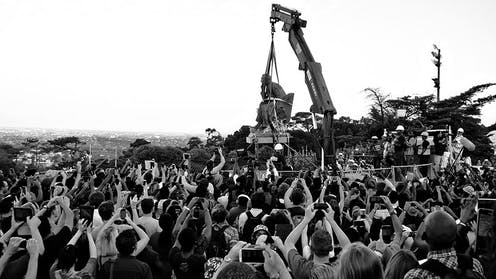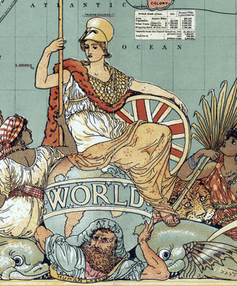Genocide hoax tests ethics of academic publishing
Reuben
Rose-Redwood, The Conversation, July 2, 2018
is on the rise. In Canada alone, it increased by a staggering 600
per cent between 2015 and 2016 as part of what some have called “the Trump
effect.”
 |
| Debates over the history of colonialism have sparked controversies on university campuses in recent years, as illustrated by the removal of a statue honoring Cecil Rhodes at the University of Cape Town in 2015. Desmond Bowles, CC BY-NC-SA |
Academia
is not immune to this trend. According to a recent study, some scholars have
sought to promote “colonial
nostalgia and white supremacy” by using the “scholarly veneer” of academic
journals to spread “what are otherwise hateful ideologies.” What are
the responsibilities of scholars in light of these developments? Are there any
ethical limits to what is acceptable for debate in scholarly journals?
an extreme example, would an article advocating for genocide
be fair game for publication, or is it beyond the ethical bounds of legitimate
scholarly debate? That these sort of questions even need to be asked is a
testament to the troubling times in which we live.
academic controversies, such as the debate over the “Ethics and
Empire” project at Oxford, which seeks to develop a “historically
intelligent Christian ethic of empire” in order to justify
neo-imperialist interventions in the present, have given a new sense of urgency
to addressing the ethics of academic scholarship. Yet when leading
historians and other scholars have challenged the legitimacy of such
scholarship, the
self-proclaimed champions of “free speech” have predictably claimed
that academic freedom is under assault.
a scholar’s right to free speech does not entitle them to be granted unlimited
access to whatever scholarly platform they desire. Scholarly journals have a
right to reject any article they decide is unfit for publication — whether due
to lack of scholarly merit or on ethical grounds.
scholarly community also has a right to question the judgement of academic
journal editors if they believe that a published article does not meet the
basic standards of academic conduct.
precisely the situation that arose last year when a prominent international
studies journal published an article praising the virtues of colonialism while
ignoring the atrocities of colonial rule.
for colonialism” debacle
World Quarterly published Bruce Gilley’s “The Case for Colonialism”
last fall, it sparked
outrage within the scholarly community. Not only did the article
proclaim that colonialism was “beneficial” to the colonized, but it also
advocated for the recolonization of former colonies by the Western powers.
 |
|
European
colonialism was based upon
the establishment of racial hierarchies
that
subjugated colonized peoples to
European control.
Walter Crane/Boston Public
Library |
In
response, two
petitions
garnered over 18,000 signatures calling for the article’s retraction. The
petitions argued that the article should never have been published since its account
of the history of colonialism was deeply flawed and its
recolonization proposal would violate the
basic human rights of millions.
publisher, Taylor & Francis, eventually withdrew the
article. Yet they did so not for the reasons laid out in the
petitions, but allegedly due to threats of violence against the journal’s
editor. To date, the publisher has not released any concrete evidence related
to these threats, nor have they explained whether a criminal investigation was
conducted into the matter.
the petitioners welcomed the news of the article’s retraction, both critics and
supporters of the Third World Quarterly viewed the publisher’s rationale for
withdrawing the article due to violent threats — rather than a lack of
scholarly merit — as setting a dangerous precedent.
the article was recently
republished by the National Association of Scholars, a conservative
advocacy group, in the name of supporting “academic freedom.”
of the Third World Quarterly had made much the same argument in a petition
published in The Times
last December, which stated that academic
journal editors have a right “to publish any work — however controversial —
that, in their view, merits exposure and debate.”
and academic freedom
exactly “merits exposure and debate” in scholarly journals? As the editor of a
scholarly journal myself, I am a strong supporter of academic freedom. But
journal editors also have a responsibility to uphold the highest standards of
academic quality and the ethical integrity of scholarly publications.
looked into the pro-Third World Quarterly petition in more detail, I noticed
that over a dozen signatories were themselves editors of scholarly journals.
Did they truly believe that “any work — however controversial” should be
published in their own journals in the name of academic freedom?
had no qualms with publishing a case for colonialism, would they likewise have
no ethical concerns about publishing a work advocating a case for genocide?
genocide hoax
October 2017, I sent a hoax proposal
for a special issue on “The Costs and Benefits of Genocide: Towards a Balanced
Debate” to 13 journal editors who had signed the petition
supporting the publication of “The Case for Colonialism.”
mimicked the colonialism article’s argument by writing:
a longstanding orthodoxy that only emphasizes the negative dimensions of
genocide and ethnic cleansing, ignoring the fact that there may also be
benefits — however controversial — associated with these political practices,
and that, in some cases, the benefits may even outweigh the costs.”
awaited the journal editors’ responses, I wondered whether such an outrageous
proposal would garner any support from editors who claimed to support the
publication of controversial works in scholarly journals.
they think that a case for genocide “merits exposure and debate,” or would any
of the editors raise ethical concerns about its content?
turns out, nine of the
editors declined to move forward with my proposal and the remaining four never
responded. This seemed to be a reassuring sign that there were still
ethical standards at work in the editorial decision-making process. However,
the reasons for their rejections differed markedly, and very little had
anything to do with scholarly ethics.
editors’ responses
editors noted that their journals rarely if ever accept special issue
proposals, while two others explained that the topic of genocide didn’t align
with the focus of their journal. Interestingly, several editors expressed
skepticism about whether there was a need for “balanced” debate on the topic.
concerning were those who declined the hoax proposal but praised it
nonetheless. For instance, one editor noted that the proposal “sounds
fascinating.” Another offered encouraging advice and even stated that “I hope
you do find an outlet.”
the responses to the hoax, only one editor raised any major ethical concerns
about the nature of the proposal itself.
to the submission as “morally repugnant” and “offensive,” the editor said it
was simply unthinkable to imagine that such a proposal could even have been
submitted for consideration to a scholarly journal.
a forceful defense of the ethical integrity of academic publishing if ever
there was one. Yet why had this very same editor supported the publication of
“The Case for Colonialism,” especially given the historical
linkages between colonialism and genocide?
ethical limits of scholarly debate
journalist brought the comparison between colonialism and genocide to the
attention of Bruce Gilley, author of “The Case for Colonialism,” Gilley made a very
revealing comment. He said that:
absurd analogy. Genocide, I think everyone would agree, is a moral wrong.
There’s absolutely no plausible philosophical argument that one group of people
establishing authority over another is an inherent moral wrong. Human history
is all about alien rule.”
statement is remarkable in a number of ways. For starters, it ignores the fact
that a basic
principle of international law is that the “subjection of peoples to
alien subjugation, domination and exploitation constitutes a denial of
fundamental human rights.”
 |
| Colonialism violates the right to self-determination as established by UN Resolution 1514(XV), 14 December 1960. Patrick Gruban/Flickr |
It also
obscures the undeniable historical
connections between colonialism and genocide. And, lastly, it is a
tacit acknowledgement that an academic work which promotes a “case for
genocide” is indeed beyond the bounds of legitimate scholarly debate on ethical
grounds.
freedom notwithstanding, it seems there is, in fact, general
agreement that scholars must have at least some sort of ethical limits to
academic debate. The key point of contention is where exactly those lines
should be drawn. Gilley and his supporters would have us believe that making a
case for colonial domination is well within those limits.
part, I’ll stand with the more than 18,000 scholars who have argued that if an
academic work is calling for the violation of basic human rights and
fundamental freedoms, that’s a pretty good indication it doesn’t deserve the
time of day from reputable scholarly publishers.


